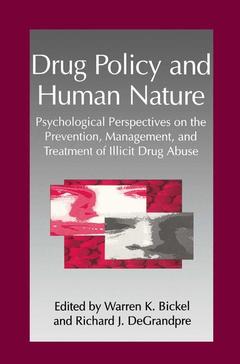Description
Drug Policy and Human Nature, Softcover reprint of the original 1st ed. 1996
Psychological Perspectives on the Prevention, Management, and Treatment of Illicit Drug Abuse
Coordinators: Bickel W.K., DeGrandpre R.J.
Language: English
Subjects for Drug Policy and Human Nature:
Publication date: 08-2013
326 p. · 15.5x23.5 cm · Paperback
326 p. · 15.5x23.5 cm · Paperback
Description
/li>Contents
/li>
The formation of drug policy is a complex phenomena influenced by a multi tude of sources. Among others, these influences include historical factors, contemporary public opinion regarding the nature and magnitude of drug use and abuse, the portrayal of illicit drugs and drug use in the media, and lobbying efforts by special interest groups (e. g. , The Drug Policy Foundation), including government agencies (e. g. , the Justice Department and law enforcement). An additional source of influence are the activities of specialists directly engaged in studying drug use and treating drug dependence. This includes individuals involved in drug treatment, anthropological and cultural studies, policy analy ses, basic psychological and pharmacological research, research on the epide miology of drug use and dependence, and research on prevention. This influ ence by specialists might be usefully distinguished from those influences first mentioned for two reasons: First, studies of drug use and dependence attempt to uncover empirical generalizations about drugs, and second, because these findings are empirical, there is a hope that they guide, at least to some extent, the actions of other forces that more directly determine drug policy. Psychology as an empirical discipline has long been interested in the use of psychoactive drugs. At the level of basic science in psychopharmacology, a most important contribution has been the demonstration that drugs of abuse function as reinforcers and thus enter into the same psychological processes as do other appetitive stimuli.
Informing Drug Policy via Psychological Science: Basic Research in Drug Abuse and Its Determinants: 1. Environmental Factors in the Instigation and Maintenance of Drug Abuse (J.L. Falk) 2. Psychological Science Speaks to Drug Policy: The Clinical Relevance and Policy Implications of Basic Behavioral Principles (W.K. Bickel, R.J. DeGrandpre) Informing Drug Policy via Psychological Science: Changing Drug Use: 3. Psychological Approaches to Prevention (B.H. Bry) 4. Drug Abuse, Drug Treatment and Public Policy (S.M. Hall et al.) 5. Cultural Factors in the Prevention, Management and Treatment of Illicit Drug Use: The Earthlings' Psychological Trek (J. Westermeyer) Informing Drug Policy via Psychological Science: Innovations in Treatment Services: 6. Achieving the Public Health and Safety Potential of Substance Abuse Treatments: Implications for Patient Referral, Treatment Matching, and Outcome Evaluation (A.T. McLellan, C. Weisner) 7. Drug Policy and the Enhancement of Access to Treatment (J.V. Brady) The Psychology of Drug Policy: Psychological Assumptions Behind Policy: 8. Examining the Behavioral Assumption of the National Drug Control Strategy (R. MacCoun, J. Caulkins) 9. Assumptions about Drugs and the Marketing of Drug Policies (S. Peele) 10. The Pharmacological Understanding of Psychoactive Drugs: Basic Science in the Context of Differential Prohibition (A.P. Leccese) The Psychology of Drug Policy: Social and Cultural Factors Influencing Drug Policy: 11. American and Canadian Drug Policy: A Canadian Perspective (B.K. Alexander et al.) 12. The War on Drugs as a Metaphor in American Culture (D.B. Heath) 13. The Impact of Socially Constructed Knowledge on Drug Policy (R.J. DeGrandpre) Index
© 2024 LAVOISIER S.A.S.
These books may interest you

Drug Policy and the Public Good 61.80 €



